
SQA exam results day 2022: what we’ve learned
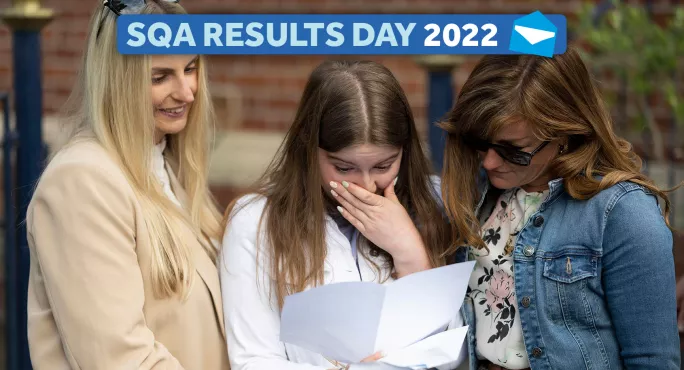
Scottish Qualifications Authority (SQA) results have been published this morning after the first national exams since before the Covid pandemic, in 2019.
They reveal that the pass rate is lower than it was last year at National 5, Higher and Advanced Higher - but higher than the last time that national external exams were held in 2019.
The attainment gap between the students living in the most and least deprived areas of Scotland has also widened this year after the cancellation of the exams in 2020 and 2021 led to big increases in the proportion of pupils from the most disadvantaged areas - in particular - gaining national qualifications.
- The nerves are back: A teacher’s view of SQA exam results day 2022
- Related: A student’s view of SQA exams results day 2022
- The future of exams: Student assessment should not follow the driving test model
This year the pass rate at National 5 is 80.8 per cent - down from 85.8 per cent last year and 89 per cent in 2020, but up from 78.3 per cent in 2019.
The pass rate at Higher is 78.9 per cent - down from 87.3 per cent last year and 89.3 per cent in 2020, but up from 74.9 per cent in 2019
The pass rate at Advanced Higher is 81.3 per cent - down from 90.2 per cent last year and 93.1 per cent in 2020, but up from 79.6 per cent in 2019.
The pass rates we have used for 2019, 2020 and 2021 (see graph below) are based on the most recent SQA figures, published in December each year.
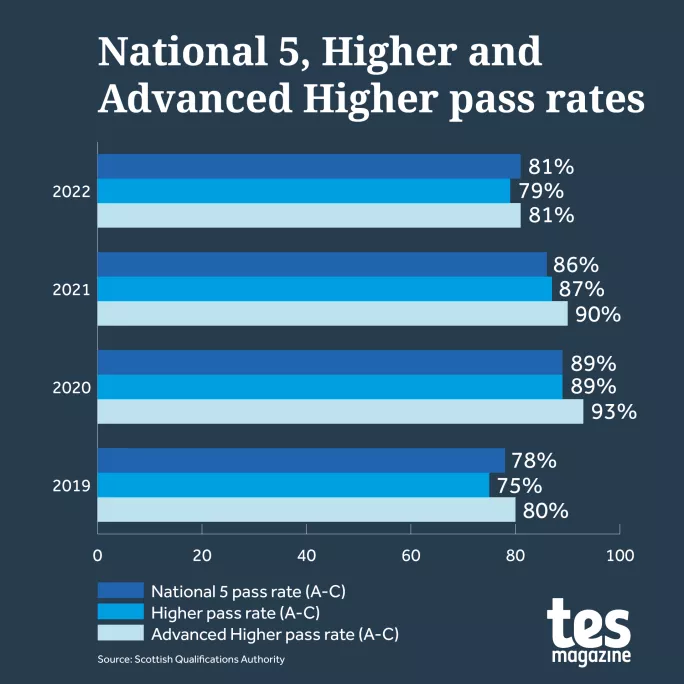
The attainment gap, meanwhile, widened at National 5, Higher and Advanced Higher when compared to 2020 and 2021. At Higher, for instance, the attainment gap between those students living in the most and least deprived areas is 15 percentage points in 2022, as compared to 7.8 percentage points last year and 6.6 percentage points in 2020.
In 2019, the attainment gap at Higher was 16.9 percentage points.
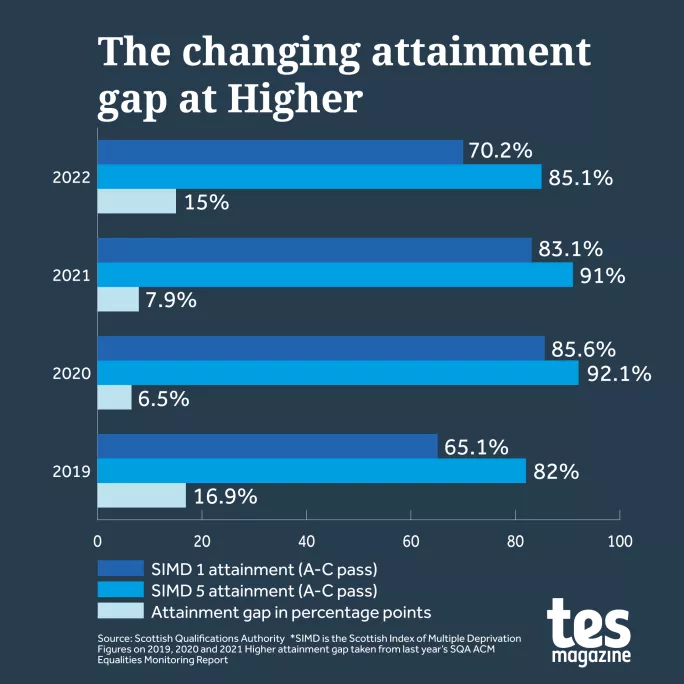
Education secretary Shirley-Anne Somerville described the results as “one of the strongest ever sets of results for any exam year” - given that pass rates were up on 2019, with A passes also up, and skills-based qualifications “close to the highest ever figure”.
The A-grade figures we have used below for 2019, 2020 and 2021 (see graph below) are based on the most recent SQA figures, published in December each year.
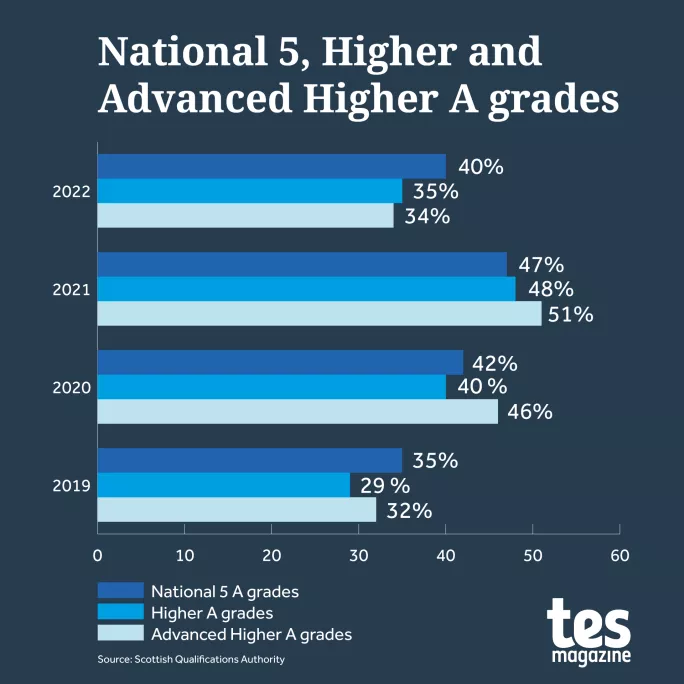
Ms Somerville also highlighted that the attainment gap had narrowed when compared to 2019. However, opposition politicians have criticised the government for presiding over larger attainment gaps than those recorded in 2020 and 2021.
The education secretary said: “It is important to note, though, that although 2022 saw a return to exams, it was not a return to normality. The approach to exams reflected the disruption to teaching and learning that young people faced and a wide-ranging package of support and modifications was put in place.
“I am confident that the approach, which was informed by views from across the education system, as well as learners, has delivered a credible, consistent and fair set of results for our young people. Indeed, universities have assured learners that they support the 2022 approach to assessment, and industry leaders have spoken publicly about how much they value this year’s qualifications.
“Today’s results illustrate the wide range of qualifications that learners are choosing, and I welcome the increase in skills-based awards. These qualifications equip young people with the skills they need to enter apprenticeships or go into the workplace, where they will support Scotland’s economic recovery after Covid-19.”
She added that - while the attainment gap was narrower this year than it had been in 2019 - the government was determined to “accelerate the progress”.
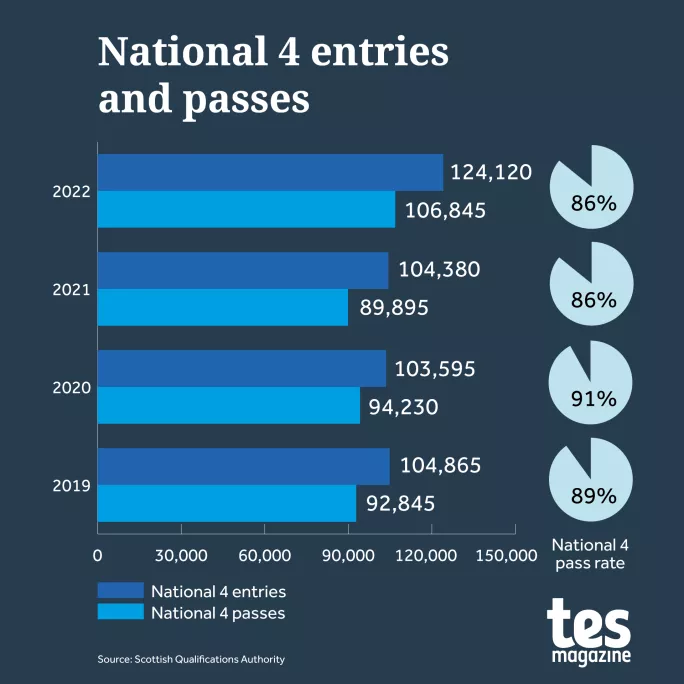
However, EIS teaching union general secretary Bradley hit out at the return to national external SQA exams, saying it had been “needlessly rushed”, was “arguably a backward step”, and had been “an additional stressor to teachers and students alike”.
She said that with the forthcoming replacement of the SQA and ongoing review of assessment and qualifications there was “an opportunity to create a greatly improved system that will better meet the needs of young people in the 21st century”.
Ms Bradley added: “A system that places far less emphasis on high-stakes exams and much greater emphasis on deeper learning assessed through teachers’ professional judgement, with parity of esteem for all learners’ achievements, is the model that we should be striving for. The EIS will continue to make the strong case for a better qualifications system for all of Scotland’s young people.”
One secondary teacher messaged Tes Scotland to say they were “devastated” by their students’ Higher results.
The teacher said: ”Our higher results are much lower than predicted. We had a robust moderation model. Pupils performing at A throughout the year are getting a D. I work in a deprived area. Is this happening across the board? I’m devastated.”
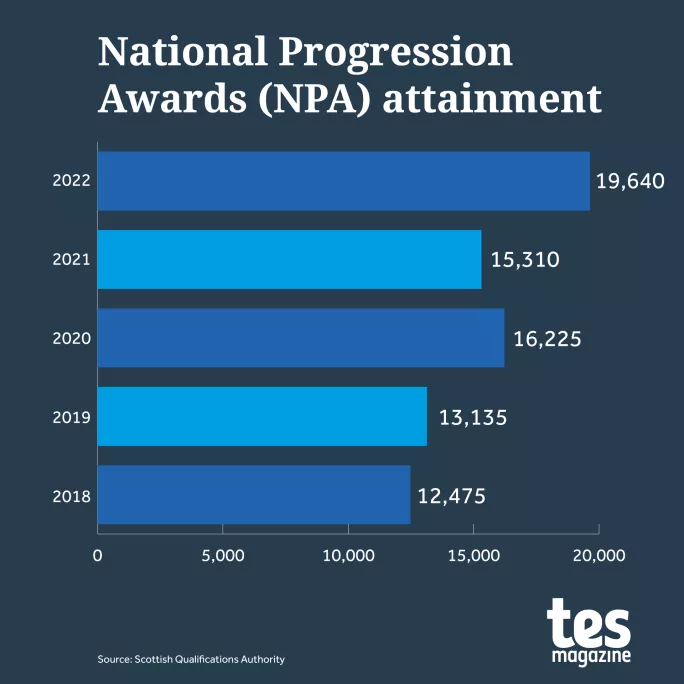
SQA chief executive Fiona Robertson said the 138,000 students receiving their certificates today should be proud of their achievements.
She added: “Learners can be confident that their qualifications provide a solid foundation for the next stage in their learning, training or employment.
“This is the first time that exams have taken place since 2019, but this year does not mark a return to normal - learners have faced further disruption from Covid-19, on the back of the two previous years of disruption from the pandemic.
“That is why SQA, teachers, lecturers and partners across the education system put in place a wide-ranging package of support this year - everyone has pulled together to help mitigate the impact on learners and to give them the best chance of performing to the best of their abilities.”
Ms Robertson added: “Together, we have delivered fairness for learners while maintaining national standards - and learners can have confidence in their grades.
“Learners have demonstrated commitment and remarkable resilience this year, giving a strong performance despite the challenges they have faced. Indeed, this is one of the strongest sets of results in an exam year.”
Scottish Conservative education spokesperson Oliver Mundell said: “The widening attainment gap is a badge of shame for the first minister [Nicola Sturgeon] and a shocking indictment of the SNP’s dismal record on education.
“Nicola Sturgeon described eliminating it as the ‘defining mission’ of her government, and yet this year the gap has widened to a chasm yet again.”
Scottish Labour leader Anas Sarwar said: “We’re now going head first into a cost-of-living crisis where more children are going to be pushed into poverty.
“I fear that the attainment gap will get even more entrenched, particularly in those more poor and deprived areas.”
Scottish Liberal Democrat education spokesperson Willie Rennie said: “At best the [attainment] gap is stagnant, at worst it has widened depending on which year is used as a comparison.
“The SNP promised the gap would close by 2026 and these results show that the government have little chance of achieving their number-one priority.”
In response to criticism from opposition parties, Ms Somerville said that the suggestion poorer pupils had been betrayed is “a real disservice to our young people who have worked under very, very difficult circumstances to have near-record pass rates for an exam year”.
She added that the Scottish government was seeing progress towards closing the attainment gap by its 2026 target before the Covid-19 pandemic.
“We know that’s been made more difficult because of the pandemic, not just in Scotland, but right across different education systems, but we are absolutely determined to still fulfil that commitment.”
You need a Tes subscription to read this article
Subscribe now to read this article and get other subscriber-only content:
- Unlimited access to all Tes magazine content
- Exclusive subscriber-only stories
- Award-winning email newsletters
- Unlimited access to all Tes magazine content
- Exclusive subscriber-only stories
- Award-winning email newsletters
You need a subscription to read this article
Subscribe now to read this article and get other subscriber-only content, including:
- Unlimited access to all Tes magazine content
- Exclusive subscriber-only stories
- Award-winning email newsletters
- Unlimited access to all Tes magazine content
- Exclusive subscriber-only stories
- Award-winning email newsletters
topics in this article



